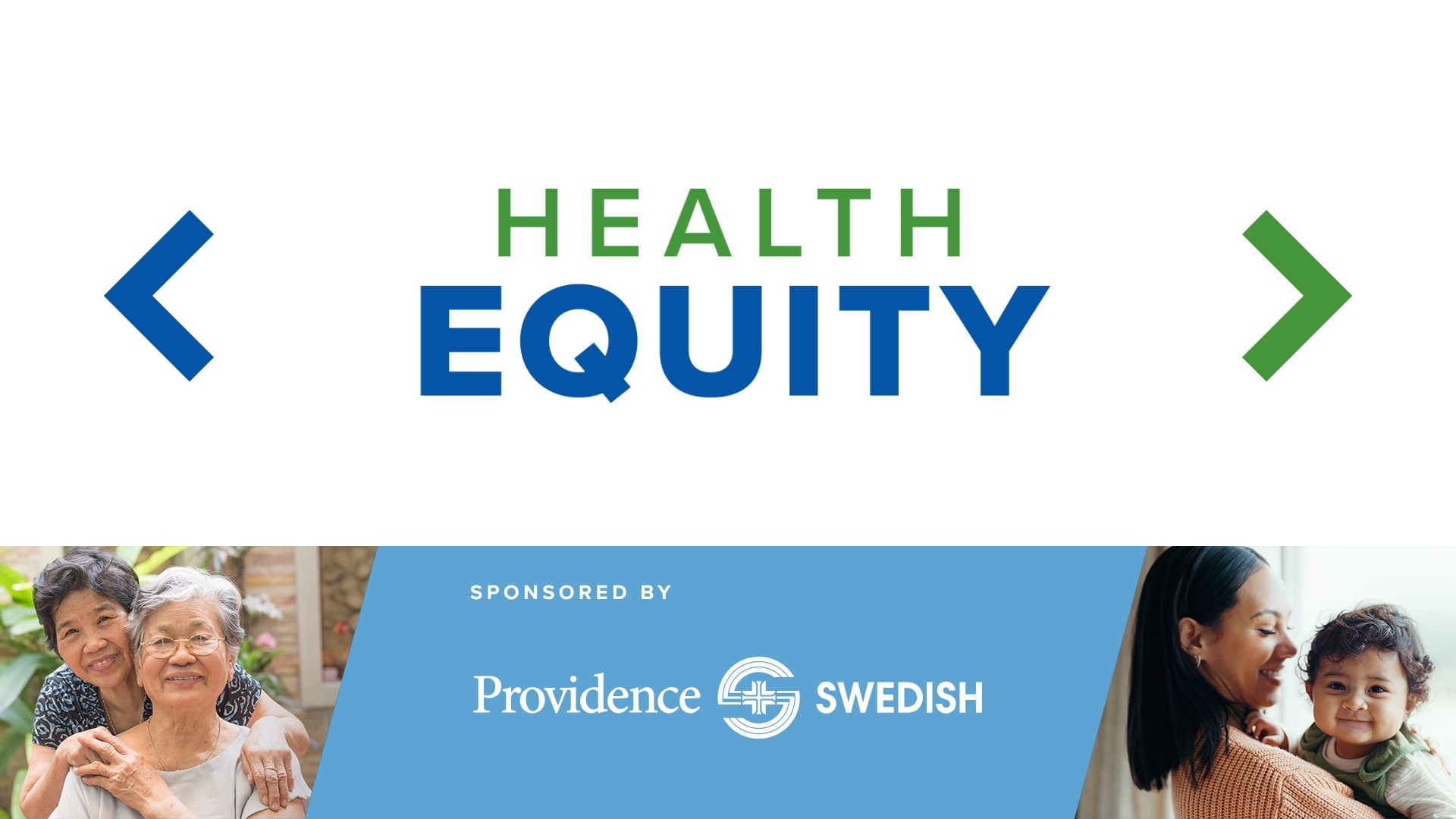Health Equity: Filling the gaps in the healthcare system
There are still large margins of people without equal access to quality healthcare, but Providence Swedish is working to fix that. Sponsored by Providence Swedish.

Just Birth
Even from a young age, Sauleiha Akangbe knew what she was born to do.
"When my mom used to sit us down and ask us what we would want to do when we grew up, I would always say I wanted to work with the moms and babies," she said.
Akangbe's long career as a doula and caregiver has been rewarding. But with Black women in the US being three to four times more likely to die during pregnancy or childbirth than any other race, she wanted to do more. So, with support from the Providence Health Equity Fund, she founded the Justice, Unity, Support, Trust Birth Network.
"J.U.S.T. Birth comes from the black birth empowerment initiative, which was started back in 2020, and came from a deep and personal experience that I had myself," Akangbe said. "I do just want to say that many of our doulas have lived experiences that our patients experience as well within the hospital systems. And so it was about recognizing that and really getting back to what it is that we needed to do of empowering our doulas our community, our providers, our patients, who all fall within the black, native, bipoc races and ethnicities and really empowering them."
To read the full story click here.
Asian Counseling and Referral Services
From a distance, it looks like an office building. But for thousands of local residents, the headquarters of ACRS is a second home.
"ACRS stands for Asian Counseling and Referral Service. And although it says counseling and referral service, it's a lot more than that," said Michael Byun, Executive Director of ACRS. "Our services, as much as we were rooted and founded by the Asian community, are welcoming all parts of our community to our organization."
And that welcoming feeling begins as soon as you walk in.
"We've become a movement, serving in 40 different languages, providing services and 30,000 people reached each year," said Byun. "We want to create this environment for them where they're supported. They're welcome. And then they're also connected back to their culture and see the value of being connected back to their culture, not only to not only being American, but also back to their native roots. If you walk down the hallway, you'll see activities and various rooms, and classes going, you go to our gymnasium and you see our older adults dancing to music. It's just a really wonderful and warm."
To read the full story click here.
LGBTQ+ Health
For most of their life, Keyana Buckner struggled to find their place in the world.
"I spent my early years as a lesbian kind of presenting in a more masculine way. That's where I felt comfortable," said Buckner. "Most of my life, I felt different. I never had the language to say trans up until I was 34. I didn't even know I was trans until my 30’s. I think the reason why I'm here now and considering myself trans is because there's a new experience. And that experience is that I am not fully comfortable in this body anymore. I want to live the rest of my life in a body that feels more me."
To help with their transition, Buckner was referred to the medical staff at Swedish First Hill Family Medicine.
"Coming to a clinic or coming to any kind of health care institution can be a very nerve-wracking experience for LGBTQ+ patients," said Dr. Kevin Wang, Medical Director for Swedish Health Services LGBTQ+ Program.
To read the full story click here.
El Centro de la Raza
It started in Seattle as a peaceful protest half a century ago.
"In the 70s, there was a lack of essential resources and a community center for the Latino voice. So we wanted to respond to that," said Daniela Lizarraga with El Centro de la Raza.
That response to the lack of equity for Latinos in our area eventually became, El Centro de la Raza.
"El Centro de la Raza is the center for people of all races," said Lizarraga. "We have 43 culturally and linguistically integrative programs for our youth, our children, adults and seniors. We have workforce development programs. We have a senior hub. We have a food bank; we have several navigation services. We have preschool. We have just an array of services mainly to meet the needs of our community.”
One of those needs for this growing part of the community is housing.
To read the full story click here.
Mercy Watch
What began as a conversation between two churches in 2016 has become one of the largest free mobile clinics helping the homeless in Western Washington.
"The organization is MercyWatch. We do street medicine and homeless outreach," said Dennis Kelly, Director of MercyWatch. "Today we are at Lynnwood Hygiene Center run by the Jean Kim Foundation here in Lynnwood."
Kelly says there is no black-and-white answer to what causes homelessness.
“Homelessness is complicated. I think a lot of people want to say that homelessness is an addiction issue, or heroin usage, or fentanyl or what have you. And yeah, there is that, but it's also untreated mental health issues. And it's also a high degree of poverty," said Kelly. "The challenge with the unhoused and I think this is really important is they're not the type of person that are going to come into an appointment. So you got to meet them where they are. When they see our medical van is here, they then will come and if they have medical needs to talk to our nurses or doctors that are on site."
To read the full story click here.
Sponsored by Providence Swedish.


